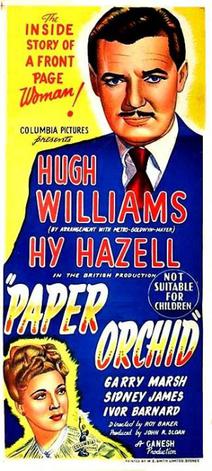| This article needs additional citations for verification. Please help improve this article by adding citations to reliable sources. Unsourced material may be challenged and removed. Find sources: "Paper Orchid" – news · newspapers · books · scholar · JSTOR (May 2019) (Learn how and when to remove this message) |
1949 British film
| Paper Orchid | |
|---|---|
 | |
| Directed by | Roy Ward Baker |
| Written by | Val Guest |
| Based on | Paper Orchid by Arthur La Bern |
| Produced by | John R. Sloan William Collier Jr. |
| Starring | |
| Cinematography | Basil Emmott |
| Edited by | Betty Orgar |
| Music by | Robert Farnon |
| Production company | Ganesh Productions |
| Distributed by | Columbia Pictures |
| Release date |
|
| Running time | 86 minutes |
| Country | United Kingdom |
| Language | English |
Paper Orchid is a 1949 British crime film directed by Roy Ward Baker, with a script written by Val Guest. It featured Hugh Williams, Hy Hazell and Garry Marsh, and was based on the 1948 novel of the same title by Arthur La Bern. It featured an early film appearance by Sid James, who later found success through the Carry On series.
It was shot at the Walton Studios just outside London. The film's sets were designed by the art director Bernard Robinson.
Plot
Despite feeling that women are unsuited to journalism, Fleet Street newspaper editor Frank McSweeney hires Stella Mason as a reporter at the Daily National. Stella starts a hugely popular gossip column, gaining the nickname 'Paper Orchid'.
When her husband dies, Lady Croup becomes the new proprietor of the Daily National. She fires Frank and another journalist, 'Johnny' Johnson - both of whom join rival newspaper the World Record. After offending Lady Croup, Stella also loses her job.
When Stella's tenant is murdered, circumstantial evidence builds up against her. She takes the story to Frank, hoping that the World Record will give her a job in return for the scoop. When he tries to force her to publish it under her own by-line she takes it to the Daily National, where its crime reporter Freddy Evans is asked to investigate it.
It emerges that Freddy actually committed the murder. He files his final newspaper report: a confession. After declaring his love for Stella, he kills himself at Charing Cross Station.
In the epilogue, Frank decides to publish Freddy's last story - pausing momentarily when he hears of his tormented colleague's death.
Cast
- Hugh Williams as Frank McSweeney
- Hy Hazell as Stella Mason
- Sid James as Freddy Evans
- Garry Marsh as Johnson
- Andrew Cruickshank as Detective-Inspector Clement Pill
- Ivor Barnard as Eustace Crabb
- Walter Hudd as Briggs
- Ella Retford as Lady Croup
- Hughie Green as Harold Croup
- Vida Hope as Jonquil Jones
- Frederick Leister as Walter Wibberley
- Vernon Greeves as John Deane
- Patricia Owens as Mary MacSweeney
- Rolf Lefebvre as Peter Pasterman
- Brian Oulton as Nightclub Manager
- Andrew Sachs as Office Boy
- Ray Ellington as himself
References
- Slide, Anthony. (2016). The Encyclopedia of British Film : Fourth edition. Manchester University Press. ISBN 978-1-5261-1197-5. OCLC 971364190.
Bibliography
- Mayer, Geoff. Roy Ward Baker. Manchester University Press, 2004.
External links
Paper Orchid at IMDb
| Films directed by Roy Ward Baker | |
|---|---|
|
This 1940s crime film-related article is a stub. You can help Misplaced Pages by expanding it. |
- 1949 films
- Films directed by Roy Ward Baker
- British crime films
- 1949 crime films
- Films set in London
- British black-and-white films
- Films about journalists
- Films based on British novels
- Columbia Pictures films
- Films shot at Nettlefold Studios
- 1940s British films
- Films scored by Robert Farnon
- 1940s English-language films
- English-language crime films
- 1940s crime film stubs